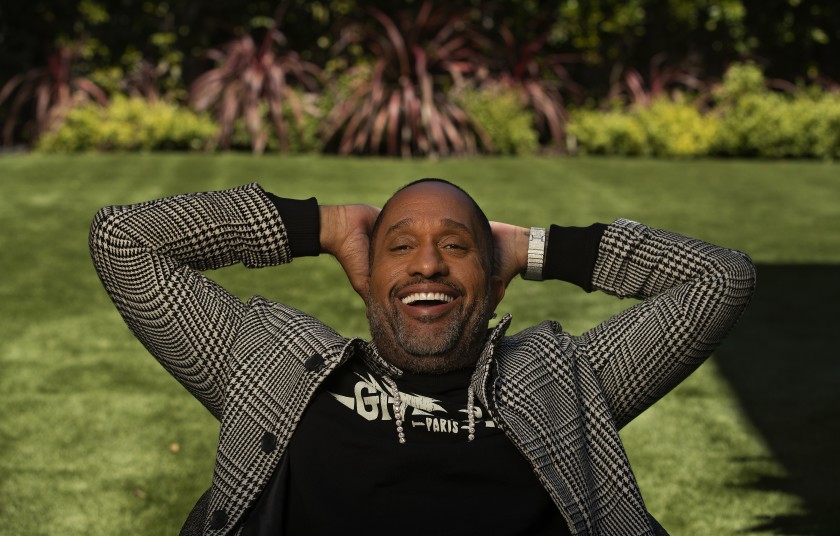Television writer Kenya Barris returns with another television show similar to the others in his arsenal. This time around, Barris is exploring his very own Black identity, Black plight, and Black experience, which reminds you that he is indeed BlackAF.
The creator of Black-ish, Grown-ish, and Mixed-ish makes a declaration with #BlackAF, which is documented and narrated through the scope of his daughter. In the first episode, it’s hard to tell if it’s a scripted reality show or if he’s poking fun at reality television? However, you soon learn it’s a show within a show. I think the cause of confusion is Barris casting himself in the not-so-convincing lead role. That decision assists in the struggle to complete the first episode. It’s saving grace for some are the familiar Black-ish elements sprinkled in there. Still, the pretentious title of his overall work falls flat within the first few episodes, which feel like white people were trying to make a show for Black people.

The genius thing about all of Kenya’s projects is there’s never anything fluff about the show’s content. There’s always a message dead smack in your face. #BlackAF has a unique way of poking fun and raising awareness of Black culture. Kenya uses this platform to put his own spin on colorism, although it seemed to be addressed a bit abrasively. The core and heart of the show is what’s easy to love and hate about it. You have a show titled “BlackAF” full of lighter complexion characters, shooting from the perspective of a biracial family who doesn’t have to endure real-life Black family issues. Let’s not negate the fact it’s chronicling the life of a socially accepted Black American family. One would suggest by the series title that they would be tackling the complexities of a “real” Black family and real adversity. However, Barris provided us with a depiction of a Black family we often don’t see. There’s already a lack of positive Black families on television, and perhaps Kenya could have done a better job at displaying a rich one, but what Kenya managed to do was display a more realistic version of today’s rich Black family. The series did a decent job of displaying Black fatherhood, especially how it differs when one has financial wealth.
Episode five, yo, between you and me… this is because of slavery, is the turning point of the series where it becomes entertaining, but it still doesn’t entertain you enough to keep you from distractions. However, it’s the series best episode. The episode examines Black art, entertainment and loyalty. The good versus the bad, and how the legs we give the bad to walk on, can prevent the good from running. It sheds light on the internal and external scrutinizing of Black art, and how it sometimes misses its understanding from both sides. Not only does it showcase the difficulty of “keeping it real” with your peers and people, but it also raises the question of loyalty and feeling the need to support Black art, regardless of good or bad, because you’re Black. The episode has a guest appearance from Tyler Perry portraying himself and cussing like we never heard before. Others who appear are Kym Whitley, Phil Morris, Mike Epps and Valarie Pettiford.

BlackAF is equipped with hilarious quirky one-liners. It may have a few parts that come off as shallow, but its objective is to stick to its main ingredient of providing relatable sceneries. Perpetuating Black stereotypical food was unnecessary. Zooming in on the collard greens at the family cookout, or watermelon sliced on the countertops wasn’t going to help the message come across any clearer. Nor was the mentioning and visit to Rosco’s Chicken and Waffles. Could Barris have eased up a bit on some of the cliché Black behavior and stereotypes, yes, but perhaps the gold chain ideology is what’s most familiar to understanding the white gaze versus the Black gaze. We celebrate our success and the fruits of our labors by purchasing shiny and pricy items like cars, jewelry and clothes. Regardless of our successes, often we’re still deemed not worthy of them because our fortune and fame can only be attributed and obtained through our athletic talents. How sometimes we’re also forced to be extremely humble about our success, which leads us to not fully bask in our success. And all that’s done was switch the narrative about US to be about them, which causes us to seek white validation. That’s why it is necessary to have friends like Broadway (Bumper Robinson) around. Broadway is that friend who represents humble beginnings. He represents the “real” you and acts as your voice of “keeping it real” reason.
It appears that “because of slavery” the show celebrates Black Love. Perhaps slavery was the reason for the shaky camera, or was that artistic purpose? Or was slavery the reason why it sometimes seemed as if the show was painting a picture of a bitter reality? Regardless of what slavery caused or didn’t, Rashida Jones was the best thing to the show. The same show that felt as though it were policing your Blackness at times…from a white proximity that is. Nevertheless, the series provided informative statistics surrounding Black people, all while serving a balance of giggles, thought-provoking situations, and disappointment in a BlackAF diaspora we don’t often see.




